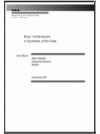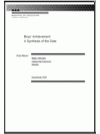This report provides a synthesis of the findings about the educational achievement of boys in New Zealand. The report updates our knowledge of boys’ participation, engagement and achievement in schooling, in particular, secondary schooling.
The results from national and international assessment surveys show that gender gaps in favour of girls are present in reading in New Zealand (and throughout the world). There is also evidence that boys do less well in writing. These skills are fundamental to full participation in a knowledge based society and thus the relative underperformance of boys is of concern. In other areas, such as mathematics and science, the results for boys and girls are similar and, in some cases, boys out-perform girls overall.
Even when boys perform less well overall than girls in a subject like reading, it is not true to say that boys are under-achieving across the board. International and national student achievement studies indicate that the achievement difference within a given gender is greater than the difference between genders. Thus a focus on a range of desired outcomes that recognises the diversity of all learners is more appropriate than one that focuses on a specific group.
The focus of this report is boys’ participation, engagement and achievement at different levels of education. It draws on a wide range of evidence from research, such as the longitudinal Competent Learners Study, national assessment initiatives (for example, asTTle, NEMP) and international assessment studies (for example, PIRLS, PISA, TIMSS), the NCEA and tertiary qualifications. The report focuses primarily on the gender differences of school-aged students but where possible it also examines the role of student ethnicity.
Key Results
The data from New Zealand and international studies show that many boys are succeeding at school. In New Zealand this includes boys from all ethnic backgrounds. There has also been no marked decline in the performance of either boys or girls over the last five years. The findings from this report are summarised below:
- Boys participate in Early Childhood Education to the same extent as girls.
- From year 1 to 10 the proportion of boys in school is consistent with the proportion in the general population but from year 11 boys are leaving school at a faster rate than girls.
- There is no difference in the rate of truancy for boys and girls, but significantly more boys, Māori and Pasifika boys in particular, are stood-down and suspended; are excluded or expelled; and gain early leaving exemptions.
- Reading Recovery is a programme designed to assist those who remain poor readers after a year of classroom instruction with learning to read and write. At six years old boys are twice as likely as girls to be entered into this programme, with Māori and Pasifika boys most likely to be entered. The outcomes of this programme are relatively similar for boys and girls.
- There are no systematic gender differences in mathematics and science achievement.
- There is converging evidence that girls perform better than boys, across all ethnic groupings, on all measures of reading and writing at all levels of schooling. However, a number of boys in New Zealand read and write well and are advanced readers and writers.
- There is evidence that the reading gender gap reduces over time but increases for writing.
- New Zealand students are found to perform very credibly in reading in international surveys. In most other countries girls also significantly outperform boys in reading, so this is not just an issue for New Zealand.
- The percentage of students gaining NCEA qualifications has increased from 2004 to 2006 but females are more likely than males to gain an NCEA qualification at all levels.
- Scholarship attainment is similar for males and females.
- Females tend to stay at school longer and leave school with higher attainment levels than males.
- Males are more likely than females to leave school with little or no formal qualification but this difference has decreased over recent years.
- Females are more likely than males to leave school with University Entrance or higher qualifications and this gender difference has grown. Māori and Pasifika males are least likely to leave school with University Entrance or higher qualifications.
- The above finding impacts on tertiary education participation with females more likely than males to participate in degree level study, and of those participating, males are less likely than females to attain a degree level qualification.
Synthesis across the data has revealed clear and consistent issues for boys. Generally these relate to the over-representation of boys in statistics relating to:
- disengagement with school;
- lower achievement in reading and writing; and
- lower qualification attainment.
As a first step to improve boys’ achievement we need to ensure that they are engaged in, and excited by, their learning, and able to achieve to their full potential.


